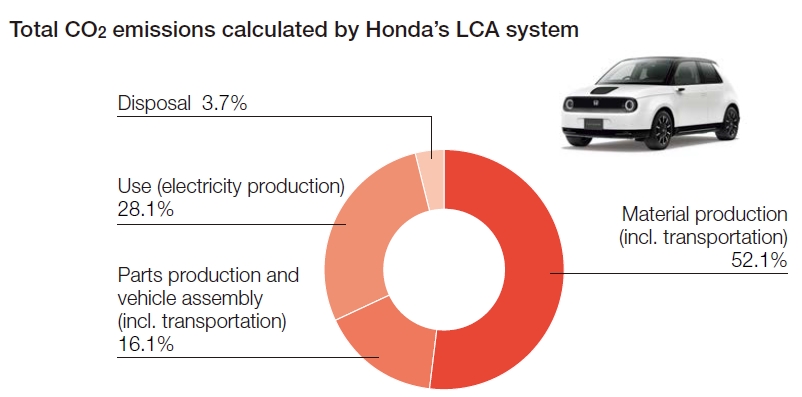
100% use of sustainable materials by 2050

Efficient Utilization of Resources
The difficulty of obtaining or the depletion of rare earth metals and other resources used in the company’s products affects the procurement of components and raw materials necessary for manufacturing and thus poses a significant risk to our business continuity.
Therefore, Honda considers the efficient utilization of resources as a vital issue and is actively promoting 3R (Reduction/Reuse/Recycling) activities as well as ensuring proper processing when disposing of end-of-life products.
Taking into consideration the risks involved in resource depletion and waste disposal, Honda aims to reduce the overall amount of waste generation. Accordingly, the company has set the goal of an annual reduction of waste generation per unit of production of 1.8% (compared with FY2019 levels) in all corporate activities in FY2031.
For water resources as well, Honda is giving consideration to water supply and depletion risks. Honda has thus established the target of an annual reduction of industrial water intake per unit of production of 1.8% (compared with FY2019 levels) in all corporate activities in FY2031.
In both areas of waste generation and water intake, the Company will remain committed to minimizing environmental impact.
In April 2021, Honda also declared they wiill achieve 100% use of sustainable materials by 2050 in order to take up the challenge of developing products made of sustainable materials with zero environmental impact.
Aiming for zero environmental impact related to resources and disposal that occur in various stages ranging from resource procurement to disposal, Honda is tackling this issue through cooperation/partnership with internal/external stakeholders.
Promoting Life Cycle Assessment (LCA)
Honda recognizes that the promotion of LCA is an important initiative not just in reducing CO2 emissions across product life cycles- from raw material procurement to product disposal- but also for implementing efforts for Triple Action to ZERO.
Honda has been quantitatively calculating and assessing CO2 emissions from all business activities by using its original Life Cycle Assessment (LCA) system. Consequently, the production, purchasing, sales and service, administration and transportation departments have been carrying out activities geared toward lower carbon emissions.
Furthermore, Honda has established procedures for calculating the environmental impact of its products during their life cycle and obtained third-party certification by TÜV Rheinland in Germany in 2023. This certification is based on the ISO 14040 and ISO 14044 standards. In the future, Honda will utilize LCA more broadly while making more proactive efforts in devising low-carbon solutions at the development stage and also reducing the environmental impact through resource circulation.